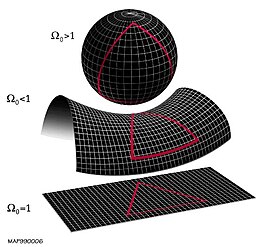If the universe is a geometric object, then it is by definition a mathematical object, no?
Of course. But you are confusing the map with the territory. I perfectly well agree that math is "unreasonably effective" in the physical sciences. The claim that the universe IS the math is a claim of metaphysics.
From the standpoint of someone who's studied more math than physics, my understanding is that mathematicians don't care in general whether their work is "real". Their work has value purely as abstraction. No connection with reality is ever implied when it comes to math. Math only tells you what's logically true based on the axioms ... and we don't even know for sure that our axioms are consistent!
So math is more like chess, a game with formal rules that's fun to play. We wouldn't say, "The universe is a game of chess and we're the pieces." That would be taken as stoner philosophy, agree?
But Tegmark says, "The universe is math," just because
certain aspects of the universe can be described
to a given degree of approximation subject to the limitations of the experimental or observational apparatus and technique. Confusing map with territory. And believing one's maps and models are real, as opposed to our own mind's interpretation of what's real. Math may be "out there," but it's also "in here," coded in our brains at a very low level. Wouldn't you like to know why it is that the human brain can do math at all? Tegmark's not asking the hard questions.
To imagine mathematics is exact in its description of reality is to commit a grave fallacy of the philosophy of science. And then to believe the math "is" rather than models the world ... that's just wrong.
I hope you don't mind if I don't engage with the rest of your post, although I enjoyed your diagram.
I actually dropped in to mention that I confirmed Aaronson's negative impression (not of the book, which everyone agrees is stimulating and educational regardless of whether you believe in his ultimate thesis.
But I did want to pass on this one quote from Peter Woyt, who writes the great physics blog Not Even Wrong.
Tegmark’s career is a rather unusual story, mixing reputable science with an increasingly strong taste for grandiose nonsense. In this book he indulges his inner crank, describing in detail an uttery empty vision of the “ultimate nature of reality.” What’s perhaps most remarkable about the book is the respectful reception it seems to be getting
There's plenty more where that came from. Woit's review is here,
http://www.math.columbia.edu/~woit/wordpress/?p=6551.
And Aaronson's review is here:
https://www.scottaaronson.com/blog/?p=1753
I probably won't read the book. But I am actually planning to make a run at reading his original paper. I have the pdf and it's not that overly long and I can probably get a better sense of his terminology and ideas. I'm sure I'll learn a lot from studying his work.
But on the metaphysics, it seems laughably wrong to be. Mathematical structures are very abstract. And in fact one of the criticisms is that he doesn't actually spend much time talking about the actual math. I get the feeling that "math" for Tegmark is "the equations that physicists use," and not math as actually practiced by mathematicians.
I have studied a fair number of those abstract entities that go by the name of "mathematical structures." And believe me, the universe isn't one of those. Not unless you believe that the universe is an artifact of set theory. Or you're arguing some sort of structuralist position that the structures are independent of our representations of them. Tegmark understands none of this as far as I know.
So anyway I think it's unfortunate if the interesting discussion of whether infinity might be actually instantiated in the physical world got sidetracked into what Tegmark thinks. That's another criticism of Tegmark. That his brand of pop metaphysics wrapped up in scientism crowds out intelligent discussion of the fundamentals.
I'm not going to talk about Tegmark anymore. But I am going to make a serious run at his paper, which by the way is here if anyone's interested.
https://arxiv.org/pdf/0704.0646.pdf
Ok thanks for listening. No more Tegmark rants from me but I would love to talk about what it means for actual infinity to be instantiated in the world. And I'd welcome specific pointers to claims that actual infinity is instantiated in some theory. Sean Carroll's Wiki page didn't say anything about it.

